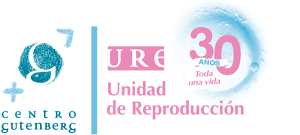How does age impact male fertility?

A lot is said about the age of the female and how it relates to fertility, but little about how the age of the male impacts fertility when it comes to trying to conceive.
As you have likely read in previous blog posts, you will not be surprised when we tell you that female fertility begins to decline drastically after the age of 35 (if you are surprised, we recommend reading this blog article where we tell you how a female’s age impacts her fertility and ability to become a mother). But, what about the male? Does age affect male fertility?
How does age affect male fertility?
When talking about male fertility, we can say that 35-40% of cases of couples experiencing difficulty conceiving can be attributed to the male partner. There are illnesses that can lead to male infertility which we list here, but age is also a factor to take into account.
A male’s age also has an impact on his fertility, although not as drastically as it does for females. Many studies show a worsening of sperm quality as men get older, especially from the age of 45 onward, when a clear decline in sperm parameters, especially ejaculate volume and motility of the spermatozoids, can be observed.
Age and sperm DNA fragmentation
There are also studies that have shown that as men age, oxidative damage to spermatozoids increases, which is known as DNA fragmentation.
A spermatozoid with fragmented DNA is less likely to fertilise an egg; if fertilisation does take place, there are higher chances of having poor quality embryos, which could lead to a greater risk of implantation failure and recurrent miscarriage.
For this reason, one of the diagnostic tests we offer at URE Centro Gutenberg is the sperm fragmentation test, which we especially recommend to older males before starting in vitro fertilisation treatment. We also recommend this test to males in cases of fertilisation failure, implantation failure and recurrent miscarriage.
In the event that a male’s test results are abnormal, we offer specific techniques that are capable of selecting the best sperm to be used for ICSI during fertility treatment. These techniques include:
- Macs
- ZyMöt ICSI
- PICSI
The selection of one technique over another will depend on the quality of the sperm sample.
Does a male’s age have an impact on his spermatozoids?
There are published studies that show that the male’s age is related to a higher likelihood of an increased amount of sperm with chromosome abnormalities, which can in turn lead to genetic risks for their offspring in addition to miscarriage, implantation failure, etc.
As with DNA fragmentation, there are also diagnostic tests to detect the presence of these types of abnormalities, as well as the pre-implantation genetic diagnosis which can be performed as part of in vitro fertilisation treatment.
The Pre-Implantation Genetic Diagnosis is a diagnostic tool that is carried out on embryos before the embryo transfer. It is a genetic examination of the cells in the embryo to determine whether they carry any chromosome abnormalities, in turn allowing us to select only healthy embryos to transfer to the uterus.
We must point out that there is a lot of controversy surrounding this last point, and paternal age alone would not be reason enough to suggest the use of pre-implantation genetic diagnosis as part of a couple’s treatment.
The father’s age and the baby’s health
There are studies that link paternal age to an increased risk of premature delivery and low birth weight, though they are not very conclusive. There are also publications that have shown a slight increase in the likelihood of autism and schizophrenia in offspring, also currently under debate.
But it is not only age that affects sperm quality: a recent study on a large number of participants from over 50 countries has concluded that sperm quality is at a historical low, indicating that sperm concentration has dropped by half over the last 50 years. Specifically, sperm concentration has decreased from 101 million sperm per millilitre in 1973 to 49 million/ml in 2018.
There are currently several theories on the reason behind this decreased sperm quality, but there is clearly a direct relationship to the world we have created. Exposure to contaminants (endocrine disruptors) from the time we are in our mothers’ wombs and poor daily habits that negatively impact our fertility are exponentially related.
For this reason, at URE Centro Gutenberg we don’t want to end this article without first reminding you that you can control several of these factors and improve your fertility by clicking here.
Have you been trying to conceive for some time but haven’t been successful yet? And maybe you’re asking yourself when you should visit an assisted reproduction clinic to become a parent. If this sounds familiar, don’t think twice and contact us. At URE Centro Gutenberg we can offer you all the advice, guidance and help you may need from our team of experienced professionals.
Request your appointment online with URE, or call us on 0034 952 122 565
and we’ll be happy to help you. and we’ll be happy to help you.

